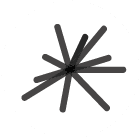A 2015 UNICEF and WHO report found that, in low- and middle-income countries, 38% of health care facilities lack access even to rudimentary levels of water, sanitation and hygiene (WASH). Goal 6 of the SDGs talks about ensuring access to water and sanitation for all. However, as we can see, we are far from reaching this goal. Gender concerns are rarely addressed, as societal barriers often restrict women’s involvement in decisions and topics concerning menstrual hygiene are considered taboos.
This 2014 research project analysed the following six dimensions in relation to WASH service provisions in health care facilities in Uganda and India: hygiene and health, security and safety, privacy, accessibility, comfort, and menstrual hygiene management. Combining social anthropology, development studies and gender studies with sanitary engineering, the project aims to provide solid information about users’ needs.
For this goal, the team defined six user groups in health care facilities: outpatients, inpatients, attendants (defined as visitors who take care of patients), medical staff, cleaning personnel, and managers and administrators. Through special focus groups taking into account gender (GALS) and semi-structured interviews, they tried to identify the most important issues. These user perceptions were then verified through infrastructure spot-checks. A mobile tool for the technical assessment of infrastructure was developed, which was then tested in health care facilities in Nepal.




This interdisciplinary research project, combining social anthropology and gender studies with sanitary engineering, investigated water, sanitation and hygiene (WASH) infrastructure and users’ needs in selected public health care facilities in India and Uganda.
WASH in health care facilities in developing countries often fail to provide user friendly and gender sensitive services, putting the most vulnerable user groups (e.g. pregnant women, small children and disabled persons) at risk. In addition to health issues, women are confronted by social norms, which often hinder proper hygienic habits during menstruation, affecting their health and challenging their dignity. Through the application of our three assessment tools, our research provides data on the sanitary requirements of health care facilities to address the gendered realities of intimate needs in the face of inadequate or poorly designed WASH infrastructure.
A technical assessment of selected sanitary infrastructures was done with an adapted and refined tool which includes specific gender indicators and is one of the project outcomes. It will be further developed into an Open Data Kit based tool for mobile phone applications. It can be used to evaluate and monitor WASH services in health care facilities worldwide. The specific needs and priorities of the patients and attendants were also explored using a modified, gender sensitive focus group discussion method, the “Gender Action Learning System” (GALS), that was modified for this project. Lastly, health centre medical staff, facility managers and cleaning personnel were interviewed using a semi-structured interview technique.
The overall data from the three different assessment tools gives evidence of needs-based, gender sensitive, technically appropriate and socially acceptable solutions to the problems identified at the health care facilities. The results were shared with the corresponding stakeholders from the medical departments, management and health authorities and are the basis of two Policy Briefs for decision makers in India and Uganda. A video and an academic article are in production as further project outcomes. The publications will be relevant for health care managers, health authorities, and the local communities, and made accessible to relevant actors at local, regional and national levels.




At the invitation of BORDA, 83 representatives from the public and the private sector, civil society, academia, media, and international donor organisations from Africa, Asia, Europe, and Latin America met on November 10 and 11, 2015 in a conference at the House of Parliament in Bremen, Germany. The conference was organised as a response to the need for action that had been identified at prominent conferences, such as the 2015 World Water Forum in South Korea and World Water Week in Stockholm.




Health care facilities in low- and middle-income countries are “high risk” settings and pose special challenges to achieving sustainable water, sanitation and hygiene (WASH) services. Applied research conducted in India and Uganda analysed six dimensions of WASH services provision in selected health care facilities: hygiene and health, security and safety, privacy, accessibility, comfort and menstrual hygiene management. Findings underline the low priority accorded to WASH facilities and services, e.g. missing or defunct hand washing stations, the lack of MHM materials and the means for their safe disposal as well as of basic functions, such as 24/7 water supplies and regular emptying of septic tanks. The complexity of basic WASH services, which require robust infrastructure and regular operation and maintenance, calls for more holistic WASH services monitoring and evaluation in health care facilities. An effective monitoring strategy would combine gender-sensitive WASH infrastructure evaluations, using state-of-the-art mobile phone based assessment spot-checks and data gathering tools that include Semi Structured Interviews and the participatory Gender Action Learning System (GALS). Both of these are highly effective in assessments of WASH services and facilities from user and provider perspectives.
Christoph Lüthi
Coordinator
Swiss Federal Institute of Aquatic Science and Technology – Eawag
Max Maurer
Co-Coordinator
Eidgenössische Technische Hochschule Zürich
Sabine Strasser
Co-Coordinator
University of Berne
Petra Kohler
Principal Member
Swiss Federal Institute of Aquatic Science and Technology – Eawag
Charles Niwagaba
Principal Member
Makerere University
Samuel Renggli
Principal Member
Swiss Federal Institute of Aquatic Science and Technology – Eawag
Ramesh Sakthivel
Principal Member
Tata Institute of Social Sciences
Michèle Amacker
Associated Member
University of Berne
Gloria Ankunda
Associated Member
Sustainable Sanitation and Water Renewal System
Victoria Atukunda
Associated Member
Sustainable Sanitation and Water Renewal System
Niladri Sekhar Dhar
Associated Member
Tata Institute of Social Sciences
Francis Ndyabawe
Associated Member
Sustainable Sanitation and Water Renewal System


Swiss Network for
International Studies